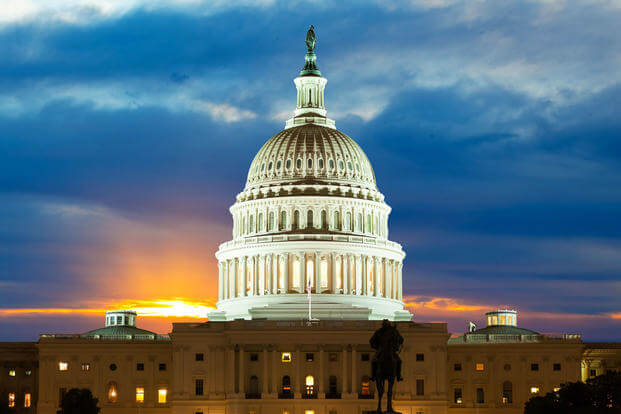A federal government shutdown can have a direct impact on U.S. service members, military families and veterans. While each shutdown is different, guidance from federal agencies such as the Defense Department and Department of Veterans Affairs may provide a clue to how a shutdown could affect these groups.
In guidance updated Feb. 27, 2025, for example, the VA said certain services would continue and others would stop.
Veterans Benefits
VA benefits and services that will continue in a shutdown include:
- Health care at VA medical centers, clinics and Vet Centers
- Benefit and compensation processing, delivery and payment
- Burials and processing of applications for burial benefits
- Appeals decisions on veterans' cases
- VA Contact Centers and the Veterans Crisis Line
VA services that will stop in a shutdown include:
- Career counseling and transition assistance activities
- GI Bill hotline
- Benefits regional offices
- Public affairs and outreach to veterans
- Headstone placement and groundskeeping at national cemeteries
- Pre-need burial application processing
- Printing of presidential memorial certificates
The VA is able to continue some benefits due to advanced appropriations that it receives each year from Congress.
Read More: GOP Plan to Avert Government Shutdown Would Fund Next Month's Junior Enlisted Pay Raise
While this is good news for veterans, things get a bit tricky for active-duty service members and their families. Here's what you need to know:
Military Pay
Many service members and military families believe they'll never have to worry about their pay during a government shutdown. This is false.
During a government shutdown, missions deemed essential to national security continue, but the troops working on them can't get paid unless Congress passes emergency legislation to allow military paychecks to continue. That's what happened in 2013, when lawmakers passed a bill just before a 16-day shutdown started to ensure troops wouldn't miss a paycheck.
Without any such measure:
"In case of a potential government shutdown, the Department of Defense has no legal authority to pay any personnel -- military or civilian -- for the days during which the government is shut down," the Defense Finance and Accounting Service (DFAS) told Military.com in 2023.
It's important to note that most government shutdowns have been short in duration and occurred between pay periods, so paychecks went out as usual, but circumstances could be different in the future. In addition, back pay is guaranteed by the Government Employee Fair Treatment Act, which was signed into law in 2019, and no longer requires separate legislation to secure.
Read More: How a Government Shutdown Impacts Military Pay, Benefits
Legislation during past shutdowns guaranteed that military pay continued, but such bills apply only to that fiscal year. And during the 2018-19 government shutdown, paychecks were suspended for about 41,000 active-duty Coast Guard members, 6,000 reservists and 8,500 civilian employees because the Coast Guard falls under the Department of Homeland Security, not the Defense Department.
For active-duty military in general, although back pay is guaranteed, paycheck deposits could be delayed. That's because the process of making military payroll begins long before the actual payday, so a shutdown could affect this timeline.
Working
A lot of people say, "Well, if I'm not going to get paid, I don't have to work." As much as we all love an unexpected vacation, that's not how it works when it comes to federal service if you're considered an essential employee. Most active-duty military members, and those under active-duty orders, are expected to show up for work, regardless of whether they'll get paid.
Housing
If you live in base housing, your services will likely remain intact. "Housing and food services for military personnel" was explicitly listed as an exception to shutdowns under the DoD's shutdown guidelines, published Sept. 12, 2023.
In theory, if DFAS (which is under the DoD) became unable to pay allotments to privatized housing companies, it could start the process of evictions, but that's extremely unlikely to happen.
Commissaries
Overseas commissaries, plus any that are located in remote U.S. locations "where no other sources of food are reasonably available for military personnel," would have remained open during a government shutdown in 2023, the DoD's guidelines stated.
All commissaries will likely continue to operate in a 2025 shutdown, according to a statement attributed to "DeCA Leadership" and posted to the social media accounts of Joint Base Pearl Harbor-Hickam, Hawaii, in December 2024:
“Given our use of Defense Working Capital Funds, DeCA will remain fully operational during an absence of an appropriation. This will be our posture for the foreseeable future - allowing us to continue to deliver on our mission in support of the military community and their families."
During the 2013 shutdown, U.S. commissaries remained open for one day to sell perishable items such as produce, dairy and meat. They were supposed to remain closed for the rest of the shutdown but began reopening after about a week because of an interpretation that the Pay Our Military Act also applied to civilians.
There is no guarantee a future shutdown would operate the same way. Even if commissaries remained open, they may not receive new shipments or restock shelves. Your best bet is to stock up on groceries, especially if you rely on the commissary for your food.
Schools and Child Care
In past government shutdowns, schools operated by the Department of Defense Education Activity (DoDEA) were deemed essential and to remain open during the regular school year.
Sporting events and extracurricular activities, including sports practices, were to be paused unless the activity was fully funded by other means.
If your child goes to day care at an on-base Child Development Center (CDC), you'll want to check for closures. Some centers might remain open, while others will likely close on a case-by-case basis. The best thing to do is call.
Leave
During past shutdowns, leave wasn't guaranteed for those affected by furloughs but was permitted through separate legislation.
The Government Employee Fair Treatment Act of 2019 gave federal employees permission to use their paid leave during a shutdown, including for future shutdowns. This is true even for "excepted" workers, meaning those required to show up for work without receiving timely paychecks.
The leave must be authorized by a superior, however.
The OMB outlines pay and leave rules here.
Amanda Miller, Rebecca Kheel, Patricia Kime and Tiffini Theisen of Military.com contributed to this report.
Keep Up With Military Pay Updates
Military pay benefits are constantly changing. Make sure you're up-to-date with everything you've earned. Subscribe to Military.com to receive updates on all of your military pay and benefits, delivered directly to your inbox.




















